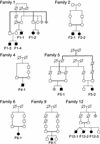Clinical and molecular analysis of patients with defects in micro heavy chain gene
- PMID: 12370281
- PMCID: PMC151150
- DOI: 10.1172/JCI15658
Clinical and molecular analysis of patients with defects in micro heavy chain gene
Abstract
Autosomal recessive disorders of B cell development are rare and heterogeneous. To determine the proportion of affected patients who have defects in the micro heavy chain (IGHM) gene, we used single-stranded conformational polymorphism analysis to screen genomic DNA from 40 unrelated patients with early onset infections, profound hypogammaglobulinemia, and absent B cells. All of the patients were genotypically normal in BTK, the gene that underlies X-linked agammaglobulinemia. Eight different mutations in the micro heavy chain were identified in 19 members of 12 unrelated families. Four of the mutations were large deletions that removed more than 40 kb of DNA in the IGHM locus. In six of the 12 families, the affected patients had an identical single base pair substitution, a G-->A, at the -1 position of the alternative splice site. Immunoglobulin haplotype analysis showed that this mutation occurred on at least three different haplotypes, indicating that this is a hot spot for mutations. Compared with patients with mutations in Btk, patients with defects in the micro heavy chain had an earlier onset of disease and more complications. Our study indicates that at least 20-30% of patients with autosomal recessive defects in B cell development have mutations in the micro heavy chain.
Figures


References
-
- Yel L, et al. Mutations in the mu heavy chain gene in patients with agammaglobulinemia. N Engl J Med. 1996;335:1486–1493. - PubMed
-
- Matsuda F, et al. Structure and physical map of 64 variable segments in the 3′ 0.8- megabase region of the human immunoglobulin heavy-chain locus. Nat Genet. 1993;3:88–94. - PubMed
-
- Cook GP, et al. A map of the human immunoglobulin VH locus completed by analysis of the telomeric region of chromosome 14q. Nat Genet. 1994;7:162–168. - PubMed
Publication types
MeSH terms
Substances
Grants and funding
LinkOut - more resources
Full Text Sources
Molecular Biology Databases
Miscellaneous

